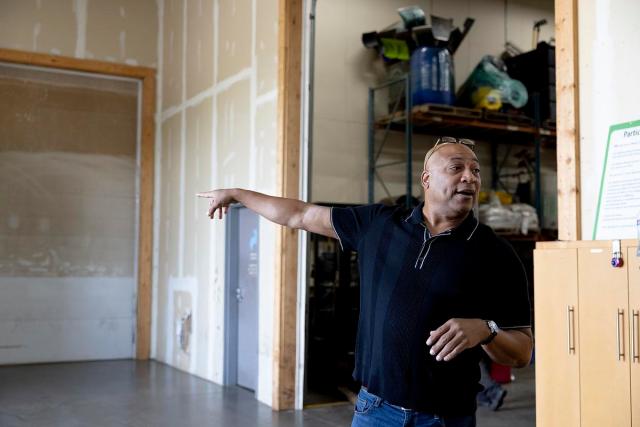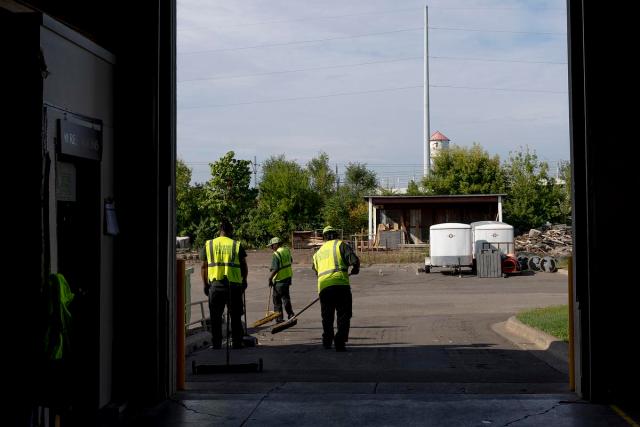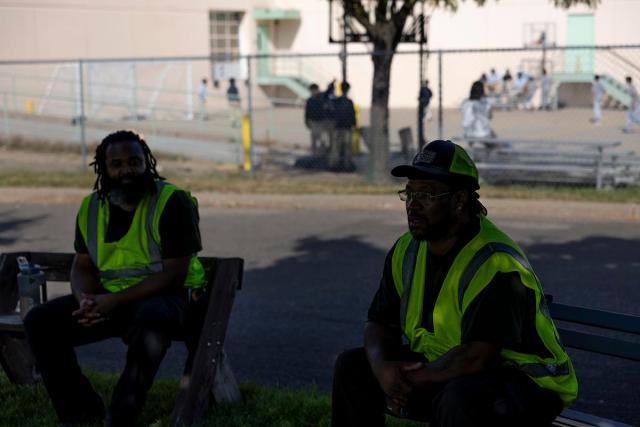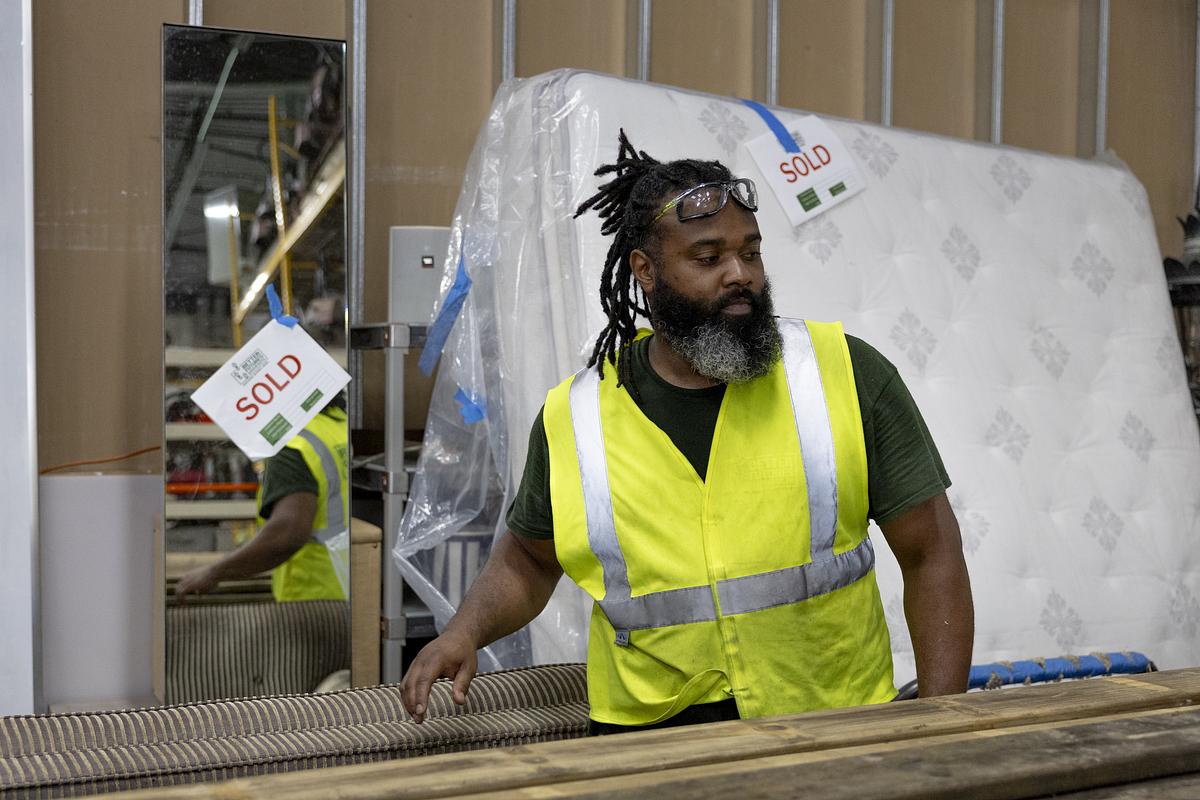After a long summer of job hunting, Johntay Neal arrived at the restaurant ready to make a good impression.
Instead, the manager he was supposed to see suddenly said she was too busy for an interview.
“It felt like she just didn’t even see me,” Neal said last week. “Why even make me come all the way here to ignore me and treat me like that?”
Minnesota’s job market outperformed the national economy in August, but people on the margins of the state’s workforce and the organizations that support them say they are feeling signs of slowdown as employers become more cautious and selective about hiring.
Neal, who recently served 32 months in prison for a weapons offense, finally got the break he needed last month when he was hired by Better Futures Minnesota, a Minneapolis nonprofit that offers training and jobs to recently incarcerated men.
 Jason Allen, director of enterprise services and waste diversion at Better Futures, gives a tour of the non-profit organization’s warehouse on Wednesday, Sept. 17, 2025, in Minneapolis, Minn. Credit: Ellen Schmidt/MinnPost/CatchLight Local/Report for America
Jason Allen, director of enterprise services and waste diversion at Better Futures, gives a tour of the non-profit organization’s warehouse on Wednesday, Sept. 17, 2025, in Minneapolis, Minn. Credit: Ellen Schmidt/MinnPost/CatchLight Local/Report for America
Better Futures Minnesota seeks to disrupt the cycle of incarceration, release, unemployment and recidivism, said Jason Allen, director of the program, adding that some participants come with an incredible work ethic driven by a desire to turn their lives around.
“You’ve got a guy who has spent 12 years or more of his life behind bars,” Allen said. “At some point, he decides, ‘I’ve lost enough. I’ve missed my kids’ birthdays. I’ve missed graduations. I’m not losing anymore more.’”
That work ethic isn’t always enough, especially in a slowing economy. Minnesota added 5,900 jobs in August, but its unemployment rate increased a tenth of a percent from the previous month to 3.6%. Meanwhile, the state’s manufacturing sector — an important one for Better Futures’ clients — saw a slight decrease of 900 jobs.
Since it was established in 2007, Better Futures has never turned people away, but it recently had to create a waitlist, and the number of people on it continues to grow.
Related: Kingsmen Project helping the previously incarcerated from reoffending
“However tough you think the job market is, it’s much harder for these men,” Allen said, noting that some who were previously placed in jobs have returned seeking services again.
Goodwill Easter Seals, another nonprofit offering employment-related services, has also noticed a growing demand for its services. The nonprofit’s employer partners have told it they are seeing more applicants at a time when many firms are trying to cut their workforce or keep it stable.
“The number of layoffs have increased pretty significantly,” said Jim Durdle, director of employment for Goodwill-Easter Seals. “It’s not the same labor market as it was a year ago, that’s for sure.”
Most of Better Futures’ participants are Black, an additional disadvantage when it comes to finding a job. The unemployment rate for Black workers is almost always the highest of any racial group and was 7.5% in August, roughly double the white unemployment of 3.7%.
After a post-prison program where he earned $3 an hour working for the Department of Corrections, Neal knew he needed a job. Of course there was the income, but he also wanted to show his two children, especially his eldest daughter, that he was ready to be a dependable, normal father.
“My 12-year-old, she doesn’t miss anything,” Neal said. “So she knew I was back, but I had to show her I would be there like I wasn’t able to before … I couldn’t do that without having a regular job. So every rejection was even more stressful.”
As employers become more discriminating about when and who they hire, those reentering society from prison are left to compete head-to-head for limited opportunities against others with high school and college degrees, professional experience and no criminal record.
“A lot of employers say that they are felon friendly, but you’ve got to have a friendly felony,” said Allen. Companies are more likely to hire someone with too many DUIs than someone with weapons or violent offenses committed many years ago, he said.
 Employees clean up the loading dock at Better Futures on Wednesday, Sept. 17, 2025, in Minneapolis, Minn. The nonprofit organization helps formerly incarcerated people gain job experience by offering them no-cost training in the construction and manufacturing industry and transition assistance. Credit: Ellen Schmidt/MinnPost/CatchLight Local/Report for America
Employees clean up the loading dock at Better Futures on Wednesday, Sept. 17, 2025, in Minneapolis, Minn. The nonprofit organization helps formerly incarcerated people gain job experience by offering them no-cost training in the construction and manufacturing industry and transition assistance. Credit: Ellen Schmidt/MinnPost/CatchLight Local/Report for America
Allen also said that since employers can’t ask specific questions about an applicant’s criminal background during an interview, they often will extend an offer and begin on-boarding the new employee, while at the same time doing a deeper background check.
“Our men get excited, because they got a new job,” Allen said. “They go to the new employer, go through their orientation, they’re given uniforms. Then HR comes back with that deeper dive and they say, ‘Oh, sorry, we can’t keep you on.’”
“That is a challenge for most of our men that the average person does not have to experience,” he said.
Better Futures Minnesota aims to get its participants into jobs that pay $16 an hour or more by teaching them skills that may have atrophied in prison, like time management and professional communication, which are learned on the job.
A typical day at its training center begins with everyone huddling up beneath two large screens that show each individual’s on-time percentage, absenteeism rate, and other metrics that a traditional employer would look at to determine a person’s value as a worker.
Of the roughly 30 names on the screen, most have a 100% on-time rate, with the rest at about 85%.
After reviewing the metrics, participants are given assignments: Some go to a job site where they will help demolish a home and salvage reusable materials. Others will work at Better Futures’ reuse warehouse. Even broken appliances are disassembled so that working parts can be recycled or sold. Functional dishwashers, stoves and laundry machines are neatly arrayed on one side of an aisle, while on the other side are a number of deep boxes, each filled almost to the top with a specific part. An entire wall of the warehouse is covered in planks of hardwood flooring of various sizes. For older homes that might need a part of the floor patched, this is a gold mine, said Allen.
“You can’t go to Home Depot or Menard’s and find 100-year-old hardwood flooring that’s going to match the aesthetic of your home,” he said.
Related: Incarcerated artists featured in powerful exhibit, ‘Seen’ at the Weisman
In addition to being an environmentally friendly business, the revenue helps fund the participants’ $17-an-hour wages and certification programs. When these costs are combined with the other services, the total is roughly $77,000 per year per participant, said Allen.
 Johntay Neal, left, and Raphael Smith take a break during their shift at Better Futures on Wednesday, Sept. 17, 2025, in Minneapolis, Minn. Neal has been in the program for about a month, while Smith has been working with the nonprofit organization for a year after four years in prison. Credit: Ellen Schmidt/MinnPost/CatchLight Local/Report for America
Johntay Neal, left, and Raphael Smith take a break during their shift at Better Futures on Wednesday, Sept. 17, 2025, in Minneapolis, Minn. Neal has been in the program for about a month, while Smith has been working with the nonprofit organization for a year after four years in prison. Credit: Ellen Schmidt/MinnPost/CatchLight Local/Report for America
For Neal, landing at Better Futures has provided him with the stability he needs while he continues searching for longer-term employment. For now, his goal is to earn his Commercial Driver’s License and become a truck driver. But longer term, his dream job is to become a fully certified, or master, electrician.
“I’ve learned a lot about how to deal with customers and co-workers,” Neal said. “I know that at some point, I’ve got to find my own job, now that I have some recent work experience and some certifications. Hopefully by then there are more jobs out there than there were this summer, but who knows.”
Related

